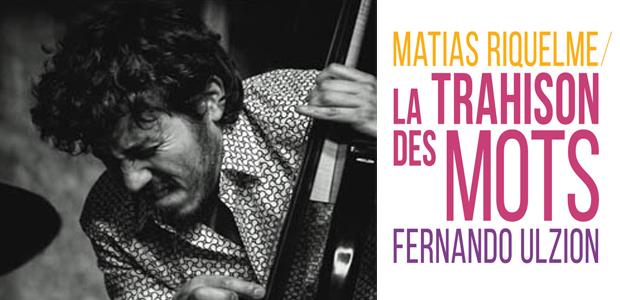We communicate perfectly using sounds - interview with Matias Riquelme

Are you a King Crimson fan? On YouTube I watched video with your performance of "Larks Tongues In Aspic III"
Matias Riquelme: I became a fan when I participated in that project. I had known about King Crimson since forever, but I had never really immersed myself in the rhythmic and intellectual schemes of this band. The piece you saw is a part of a very ambitious project by the French trumpet player Médéric Collignon, in which he replaces Robert Fripp's guitar with two string quartets (A la recherche du roi Frippé).
This project was an extremely enriching experience,and it shaped me both musically and as a person. Each concert was an explosion of energy and love of music.
You've released an album for Discordian Records. Could you tell us more about this record?
MR: This project is a trio with Miguel A. García and Fernando Ulzion. We combined aesthetics reminiscent of experimental electronic music with live electronics and strongly interventive post-production edition. It is a mixture of free improvisation and musique concrète. For some pieces we used names of baroque dances, and the album cover is magnificent. It shows a choreography of one of these dances, designed by El Pricto. It was a very good experience to mix and edit this project.
You work a lot with Fernando Ulzion. How is to work with him?
MR: I started collaborating with Fernando when I moved to Bilbao from Paris in 2017. From the first notes we shared it was magical.
We communicate perfectly using sounds. When playing, what we really do is talking, we tell each other through sounds all the bad (... and sometimes the good) that we do not dare to say with words! Our latest record that will be published by Sluchaj reflects this complicity.
What is cELLp?
MR: Cellp is like a child of mine. I conceived this project during my jazz student years in Paris. It is a quartet formed by alto sax, drums, keyboards / electronics, and electric cello. We alternated between written music, free improvisation, and live electronics. It was like my laboratory, in which I shared an unforgettable adventure with four great friends.
We recorded an album entitled "Synapse" that received very good reviews by the French press specialized in this style of music.
You don't have your own website. Are you not familiar with promoting your own music?
MR: I have always personally managed the promotion of my music, and I chose social networks as a tool to do so. This, in my opinion, is nowadays the fastest and the most efficient manner for the musicians to create networks and pro-actively advertise the releases and performances, without intermediaries.
How did it happen that you've became a cello player?
MR: My father being a musician, I've always been surrounded by instruments and this "l'embarras du choix" made it more difficult to make a choice... not of whether I wanted to do music for the rest of my life, but of which particular tool / instrument I should choose to do it. I began to study cello later than most classical instrumentalists, once I became personally convinced that it was the best option for me. The sonatas of Kodaly, Bach or Ligeti gave me the push I needed to make this choice...
What are your music plans for this year?
MR: I have several projects in mind. First, I wish to diffuse the album I have published in Sluchaj with Fernando Ulzion. We made this recording in a small town church near Vitoria in the Spanish Basque country, in Apodaka. The result of this recording inspired me to play again in large spaces with a lot of reverberation such as churches, abandoned factories, etc. On the other hand, I would also like to compose for a group, a trio or a quartet, and maybe this time get closer to the great classical pieces rather than jazz standards...
- Aby wysyłać odpowiedzi, należy się zalogować.







